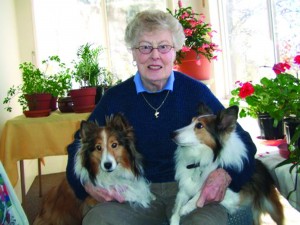Colorado College is launching an ombudsman office in August as a one-year pilot program. Jane Cauvel, professor emerita of philosophy, was recommended by the Faculty Executive Committee for the position. The ombudsman provides an informal, confidential, independent, neutral, off-the-record alternate channel of communication for faculty and staff to resolve workplace issues, and works to ensure that all members of the community are treated equitably.
Bulletin: Why do you think CC needs an ombudsman?
Jane Cauvel: The CC Board of Trustees has asked the college to develop an ombuds office. It approved our plans for an ombuds office and for me to function as ombudsperson for the coming year. Hence, I report directly to the audit committee of the Board of Trustees on positive or negative trends as I see them.
Before considering the position, I asked if there were major problems which led to the desire for such an office. I was told there were none, but it seems there is a need for more open lines of communication and more understanding of processes among individuals and departments. The office aims to alleviate conflict before it escalates.
Bulletin: What did you see as the pros and cons when you considered taking this position?
Jane Cauvel: The cons were that I have been retired from the college for about 10 years and have been enjoying a very good life. I enjoyed teaching the students, serving on committees, and working as faculty assistant to President Kathryn Mohrman. Eventually, I decided it was time for me to retire and pursue other interests.
The pros were that I had been away long enough so I didn’t know all the inner workings of the college and wouldn’t come with a lot of baggage. While talking with staff and faculty about the role of the ombudsperson, I discovered how much I enjoyed the community and the stimulation of being on campus again.
Bulletin: What have you been doing since you left the college?
Jane Cauvel: I finished a book with Zehou Li, a Chinese professor, entitled “Four Essays on Aesthetics: Toward a Global View“ (published by Roman and Littlefield; 2006). I’ve been on the board of the Grand Circle Field School, an environmental program in northern Arizona, and am on the Internal Review Board of the Memorial Health System. I’ve written some articles, been to China a couple of times, and did reading that I didn’t have time to do before. It’s been a very lively intellectual time.
Bulletin: People have been calling this position ombudsman, ombudsperson, ombudswoman. What would you call it?
Jane Cauvel: I like to call it the ombuds office. Over time, the person in the office will change but the basic values and purposes of the office will remain.
Bulletin: Do you wish there would have been an ombuds office when you were working here? Or do you think there might not have been a need?
Jane Cauvel: When I began teaching here, I would have welcomed an ombudsperson with whom to discuss perceived discrimination concerning women faculty and staff, and other minority groups. Relationships were more casual because the population was more homogeneous. I think the role of an ombudsperson will expand as institutions grow in complexity and diversity. I do not solve problems but help people find ways to make their work life and their relationships more satisfying.
Bulletin: I understand you were invited many years ago for an interview to work in the United Nations. Why was that important to you?
Jane Cauvel: I admire Eleanor Roosevelt’s role in establishing the U.N.’s Commission on Human Rights, and her other efforts at conflict management. I’ve been impressed with the successes of conflict management at the local, national, and international levels. Since it aims to resolve issues in the earliest stages and to prevent harmful escalation, we often don’t hear of the successes. I enthusiastically look forward to the challenges of the Colorado College ombuds office.
See the rest of the interview here.
